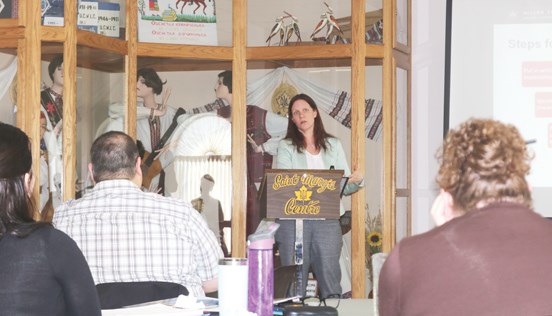While millions of Canadians are eagerly waiting for cannabis legalization to pass later this year, be it for medical or recreational reasons, many people are apprehensive over the marijuana legislation.
Economic analysts have warned that the cannabis business is a bubble ready to burst, while other people have practical concerns about how dispensaries and marijuana users will interact with the legal system.
In Yorkton, business owners have expressed concern over how they should deal with cannabis in the workplace, from medical needs to drug testing to intoxication. It’s a thorny issue that many people are navigating through for the first time.
Business owners brought their questions and concerns to the Cannabis 101: Cannabis and the Workplace workshop at St. Mary’s Cultural Centre on Apr. 4. The seminar addressed the legal and pracitcal realities of marijuana legalization in the Canadian workspace.
The Yorkton Chamber of Commerce, WorkSafe Saskatchewan, the Saskatchewan Workers’ Compensation Board, and the Saskatchewan Chamber of Commerce sponsored the day-long event.
Amy Groothuis was the main speaker for the morning portion of the workshop. Groothuis is a civil litigator who focuses on employment and labour laws. She’s currently touring across Saskatchewan with Miller Thomson LLP as part of a cannabis education effort.
“The benefit [of this tour] is ensuring employers [appreciate] the importance of well-drafted policies that respect impairment in the workplace and employers’ duty to accommodate any disability that may include a requirement...to use medicinal marijuana,” she said.
Groothuis discussed the legalization process, which is scheduled to come into effect by late-August or early-September. She said one of the biggest difficulties of dealing with cannabis is measuring the extent of intoxication in a user.
“We don’t know the point of impairment,” she said. “The science has to catch up with the legislation.”
Groothuis emphasized that cannabis legalisation will probably not result in millions of employees lighting up every day at work.
“I don’t think the sky will fall,” she said. “There may be a shift in social norms.”
Groothuis focused on two main topics in her speech: Occupational health and safety, and accommodation in the workplace for medical reasons.
Groothuis encouraged the audience to draft new drug policies to reflect the upcoming prevalence of marijuana. She said employees need to know what’s expected of them in regards to safety. Groothuis emphasized due diligence, citing prevention and good response time as keys to keeping workspaces secure.
“Employers have a duty to provide a safe work environment,” she said. “Instill a culture of workplace safety.”
Medical marijuana requirements were another topic in Groothuis’ speech. Employers have a duty to accommodate employees with special medical needs, up to an intolerable financial cost. Groothuis said marijuana prescriptions might offer a hurdle for employers, as it can be difficult to determine how cannabis may be affecting an employee. It will be a learning process.
“The duty to accommodate is not one-size-fits-all,” she said.
Groothuis fielded questions from the audience. While some answers remain to be seen until later this year, Groothuis hopes the seminar helped business owners.
“We’re getting some really great questions from each of the places that we’ve [visited],” she said.



